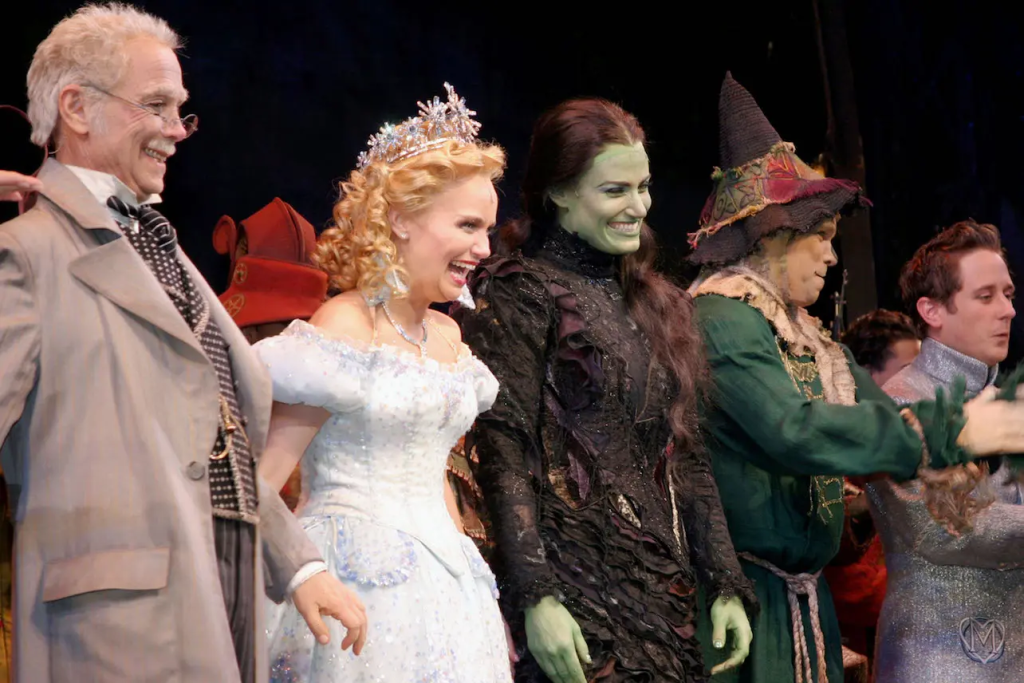Kristin Chenoweth is a name that has become synonymous with talent, charisma, and unparalleled vocal ability. Over the course of her career, she has showcased her incredible range and versatility, excelling in theater, television, film, and even music. However, one role remains particularly iconic in her extensive repertoire—Glinda the Good Witch in Wicked.
Her performance in Wicked was a game-changer, defining not only her career but also the future of Broadway musicals. It was a role that combined comedy, emotion, and show-stopping vocals, allowing Chenoweth to truly shine as a triple threat performer. Even decades later, her portrayal of Glinda remains legendary, inspiring countless actors who have taken on the role after her.
The Birth of a Broadway Phenomenon

When Wicked premiered on Broadway in 2003, it immediately captivated audiences, redefining modern musical theater. Adapted from Gregory Maguire’s 1995 novel, Wicked: The Life and Times of the Wicked Witch of the West, the musical provided a fresh perspective on the world of Oz, telling the untold story of Elphaba (the Wicked Witch of the West) and Glinda the Good Witch.
Unlike traditional fairy tales that paint characters in black and white, Wicked explored the complexities of good and evil, identity, and the price of ambition. The show resonated with audiences on a deep level, and its success was largely driven by the powerhouse performances of its two leading ladies—Kristin Chenoweth as Glinda and Idina Menzel as Elphaba.
Kristin Chenoweth’s Unforgettable Performance
From the moment Kristin Chenoweth stepped on stage as Glinda, she commanded attention. Her portrayal of the bubbly, ambitious, and occasionally self-absorbed character was a masterclass in comedic timing and vocal excellence.
While Glinda could have easily been portrayed as a one-dimensional, ditzy blonde, Chenoweth brought depth and nuance to the role. She showcased Glinda’s internal struggles, her desire to be liked, and the complicated layers of her friendship with Elphaba. She also added hilarious and charming quirks, making Glinda an absolute joy to watch.
One of the standout moments of her performance was her rendition of “Popular”, a song that perfectly captured Glinda’s playful personality. Through exaggerated gestures, impeccable comedic timing, and soaring vocals, Chenoweth turned the song into an instant Broadway classic.
But it wasn’t just the comedy that made her portrayal special—she also delivered some of the most emotionally powerful moments in the show. Songs like “For Good”, a duet with Elphaba, showed a more sincere and vulnerable side of Glinda. In these moments, audiences saw the growth of her character, proving that Glinda was more than just a charming, attention-loving sorceress—she was a deeply compassionate person who ultimately wanted to do what was right.
The Impact of Wicked on Broadway and Beyond
From its very first performance, Wicked was an unstoppable success. It broke box office records, won multiple awards, and continues to be one of the highest-grossing Broadway shows in history. Its impact on pop culture and musical theater is undeniable, with songs from the show becoming instant classics.

Kristin Chenoweth played a huge role in that success. Her charismatic stage presence and breathtaking vocals helped shape Wicked into the cultural phenomenon it is today. Critics and audiences alike praised her ability to balance comedy with sincerity, bringing a level of relatability and warmth to Glinda that made the character impossible not to love.
Even after she left the production, her portrayal of Glinda remained the gold standard, with every actress who stepped into the role afterward being compared to her. Her performance set the bar high, proving that playing Glinda required not just vocal power, but also strong comedic instincts and deep emotional range.
A Career-Defining Moment for Kristin Chenoweth
Kristin Chenoweth’s performance in Wicked earned her a Tony Award nomination for Best Actress in a Musical, and while she didn’t win, her place in Broadway history was already cemented. The role launched her into superstardom, opening doors to countless new opportunities in television, film, and music.

Following her success in Wicked, Chenoweth went on to star in hit TV shows like Pushing Daisies, guest star in beloved series like Glee, and appear in major films. She also continued her career in music, releasing multiple albums that showcased her impressive vocal range.
Despite all of her success, Glinda remained a defining role in her career. Even years later, fans continue to associate her with the character, and she frequently revisits the role in special appearances.
A Lasting Legacy on Broadway
Kristin Chenoweth’s Glinda remains one of the most iconic performances in Broadway history. She redefined what it meant to play a leading lady, proving that musical theater could be both hilariously fun and deeply moving.
She gave depth and heart to a character that could have been purely comedic, showing that even seemingly superficial people have moments of vulnerability and growth. Her ability to connect with the audience on a profound level is what makes her performance unforgettable.
Even today, Wicked continues to dazzle audiences around the world, and every time a new actress steps into the role of Glinda, she does so in the shadow of Kristin Chenoweth’s legendary performance.

Final Thoughts: A Broadway Masterpiece That Stands the Test of Time
Kristin Chenoweth’s portrayal of Glinda the Good Witch in Wicked is a masterpiece in musical theater. Her unparalleled comedic skills, unmatched vocal ability, and deep emotional connection to the role made her performance one of the most memorable in Broadway history.
Her work in Wicked was more than just a role—it was a cultural moment that defined an era of theater. Even as new generations of theatergoers fall in love with the show, her legacy as the original Glinda remains as strong as ever.
As audiences continue to celebrate Wicked and its powerful themes of friendship, self-discovery, and redemption, Chenoweth’s contribution to its success will never be forgotten. Her performance was not just entertaining—it was magical, proving that great theater has the power to inspire, uplift, and leave a lasting impact.